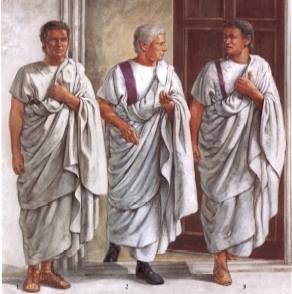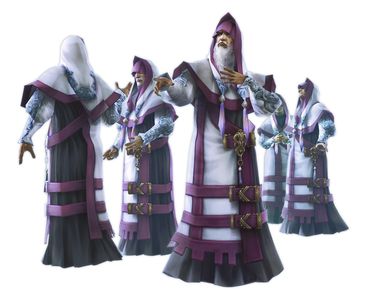The Archadian Senate:
What we know
What we know from the game basically consists in two words:
- Senate
- Gregoroth
And all events related to the Senate are the following:
| When? | Who? | What? | Why? | How? |
|---|---|---|---|---|
| Between Bhujerba and Leviathan | Archadian Senators | Working to diminish Vayne's power | To avoid omnipotence of House Solidor on Archadia | Looking for a reason to cancel his Consul role |
| When? | Who? | What? | Why? | How? |
| Between Leviathan and Raithwall | Emperor Gramis | Explaining to Gabranth that the Senate are against Vayne as a future emperor | To warn him against any Senators' manipulation on Larsa | Discussion |
| When? | Who? | What? | Why? | How? |
| Between Shiva and Jahara | Archadian Senators | Edicting Vayne's return from Dalmasca | To diminish his influence | Holding Vayne accountable for 13th fleet's loss |
| When? | Who? | What? | Why? | How? |
| Between Jahara and Eruyt | Drace and Gabranth | Recalling the Senate's plans for Larsa | To make plans to protect Larsa from danger | Discussion |
| When? | Who? | What? | Why? | How? |
| Between Henne and Bur-Omisace | Vayne | Planning to eliminate the Senate | To protect House Solidor's future | Asking his father |
| When? | Who? | What? | Why? | How? |
| Between Bur-Omisace and Miriam | Vayne | Killing Chairman Gregoroth and arresting all other senators | To protect House Solidor's future | Poison and soldiers with handcuffs |
Summary:
The whole situation between House Solidor and the Archadian Senate becomes whoever strikes the other first.
The first part of the table is alternating between Senate side's and Solidors side's distrust and scheme on the other.
The last part is the action from the winning side: House Solidor, through Vayne's intrigue.
Why is the Senate important in Archadia?
From the previous facts we can conclude the Senate is very important for 2+1 reasons:
- The Emperor does not rule alone. The political system of the Empire seems to be built with the Senate as counterbalance to the Emperor's (and House Solidor's) decisions. The senators view themselves as Archadia's protectors. All of these are proven in the cutscene to recall Vayne back from Dalmasca.
- (perhaps the most important one) The Senate has a say in choosing the next emperor. They have visibly agreed in setting House Solidor as a dynasty in the previous century, but they:
- are free to choose whoever they want among the Solidors (here: Vayne or Larsa)
- are either free to choose someone outside the current ruling family, or have the power to impeach a sitting emperor (otherwise Gramis wouldn't have mentioned "throne" in his sentence ("I must now make a choice between my throne and my son")


- have a Solidor among them. Officially, according to Archadia's documentation in the game's Bestiary, House Solidor has a seat by law in the Senate. Incredible, yes? How does that make any sense? The mysterious Solidor senator is the reason I designed this page. Without going my novel's way, we can surely say that this Solidor senator harbors no love for his family, since Gramis was never seen seeking his help regarding the overall Senate distaste, or even mentioning him. We can also assume he was killed with Gregoroth, because Vayne, who values and watches House Solidor before anything else, announced that the only remaining members were himself and Larsa.
These 3 reasons, which allowed the Senate to abuse its rights from Vayne's point of view, are the reason they were doomed to defeat. Vayne's vision for House Solidor doesn't tolerate threats and uncertainties to their rule ("rust in doubt" during his speech about necessity). The goal to cleanse this situation ranks as high as sacrificing lives in both sides.

The importance of this fictional Senate, as well as its fate told in blood, are what makes it partly similar to a Senate that actually existed: Ancient Rome's.
Ancient Rome's Senate : from kingdom to empire, a tale in three steps
The Senate, over the centuries, has mostly been an "elders' council", with the average age being significantly higher than the lower house, in the case of a bicameral legislative system. Besides, and that is clear for Ancient Rome, the senators' social category is also higher than the other chamber's. Just a look at the current names for United Kingdom (which accent all FFXII Archadians have) parliament councils is enough proof: the House of Lords, and the House of Commons. Ancient Rome's history is tied to that of its Senate, to the extent it's impossible to make any speech about it without including at least one senator's action. But, just like Archadia's Senate, its growing popularity is also the bringer of its downfall.
The Kingdom of Rome
The kingdom being the first advanced political system of Rome's we know of, it came after a period of tribal coexistence. Each tribe had their own patriarch they relied on for help, advice and representation. It was only natural that the first step to rule over all of Rome was to create an assembly with each tribe's patriarch, thus forming the Senate. Therefore, there was a senate before there was a king.
As for the word "senate", it comes from latin senatus[, senatus] : elders' council, which itself comes from the word senex[, senis (comparative: senior)] : old man.
During the Kingdom era, the Senate was in charge of selecting a new king, as well as advise him and occasionally ratify his decrees. As a matter of fact, at that time, the king had much more power than the Senate.
The Republic of Rome
The republic is the Roman political system that lasted the longest (~500 years). Its main change is letting the people's assemblies hold the most power, with plebeians getting equal rights as patricians. It was relatively the most balanced system, with temporary rulers assisted by clear-scoped magistrates, a Senate with more freedom, and popular assemblies that could enact and vote laws regardless of social status. It's the rise of cursus honorum.
During the Republic, the Senate's role increased tremendously, with the senatus consultum decrees having a connotation of high authority. Its members were not necessarily patricians anymore, but magistrates of experience. They were eventually appointed by the censor. They spoke from eldest to youngest, and voted the laws by raising their hands or moving to either side of the council room (for/against). Only the Senate had the power to appoint a temporary dictator at critical times.
The Senate's presidency was given to the head of state at the time. It's a role occupied by 2 people, who were effectively in charge of the laws execution and commanded over the army: consul. Sounds familiar?
The Empire of Rome
The Imperial Senate (of Rome)'s time can be split into 2 periods. The second one is the least relevant to our topic, because the Senate's prerogatives got considerably reduced by Emperor Diocletian starting from the 4th century. After that date, more than ever before, the senator position was mostly a token of reputation rather than a way to effectively influence any major state decision.
Since the early days of the Empire, becoming senator was again a matter of birth. Moreover, a condition of owning a certain amount of assets was added; and the nomination for the position required having one's father as senator, or the Emperor's approval.
Remember the equality progress during the Republic? Gone with the Empire. Random citizens that previously could vote via popular assemblies did not have their say anymore. Indeed, most of the latters' rights were transferred to the Senate. Focusing on the early Empire days, senators oversaw all matters in the provinces, in particular administrative, financial and legal ones. They also hold the immeasurable power (for us in the future) to make an emperor vanish from history, by ordering the removal of any trace of his existence, via damnatio memoriae decrees. They were constitutionally as important as the Emperor, whom they could nominate. However, in practice, the Emperor was often chosen by his predecessor or the army.
As a matter of fact, the senator position stayed the most prestigious civil distinction until the very end. It was a social rank before anything else, to the extent it had to be displayed (like most other ranks) on the clothing. Below is an example of Imperial Rome's senator's attire (middle), with a large purple stripe on a white tunic, next to Archadian senators wearing white hooded robes decorated with... large purple stripes.


Summary
It is no easy matter to conclude on theoretical comparisons such as this. However, we can say at this point that:
- Ancient Rome's society and Archadian society (Archades in particular) have the utmost importance of social status in common: we don't know if all the Archadian senators are from renowned families, but almost all NPCs met in the capital introduce themselves as "Archadian gentry"
- Ancient Rome's Senate during the early Empire is what resembles the most our Archadian Senate: it has (at least in theory) the possibility to appoint emperors, an advising role and a constant rivalry at the same time. They also have some authority at state level and are the only effective legislative council
- Vayne has Diocletian vibes, as the Roman emperor forsook the political system in place for an autocracy, dismissing all of the Senate's duties and considering it irrelevant. The only institution he valued was the military, who helped him rise to power. Sounds familiar yet?
- Bonus: one of the reasons of the Senate's decline during the Roman Empire was the growing importance of the equites or Equestrian Order, a social rank lower than the senators' but slowly taking all their charges, administrative ones in particular, and whose career includes military charges as well. They are also the class to which belongs the Praetorian Guard, a group of elite knights who served as bodyguards to the Imperial family, and that the Emperor trusted much more than the Senate. It is more than safe to see here respectively the Order of Judges and Judge Magisters